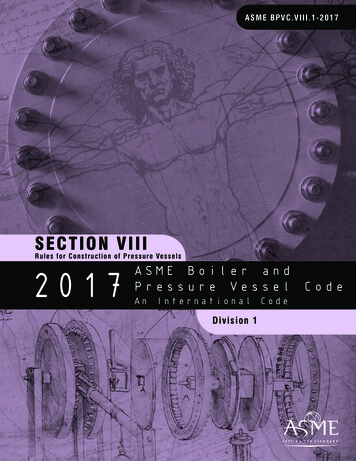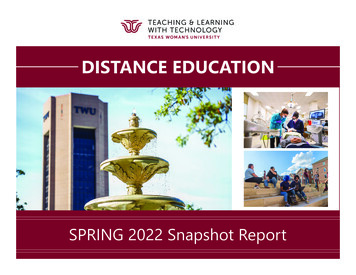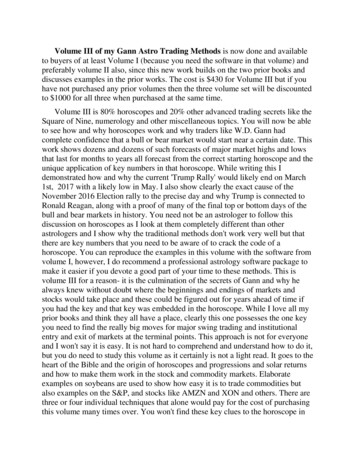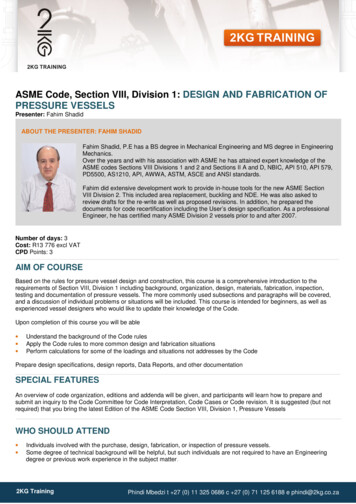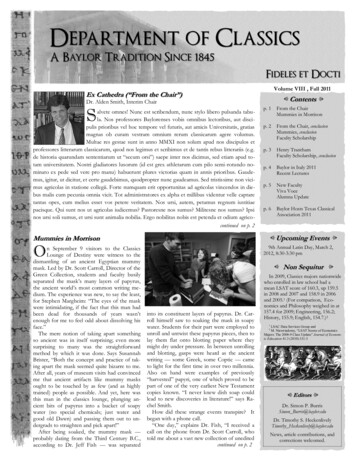
Transcription
Volume VIII , Fall 2011Ex Cathedra (“From the Chair”)t Contents TDr. Alden Smith, Interim ChairSalvete omnes! Nunc est scribendum, nunc stylo libero pulsanda tabula. Nos professores Baylorenses vobis omnibus lectoribus, aut discipulis prioribus vel hoc tempore vel futuris, aut amicis Universitatis, gratiasmagnas ob curam vestram omnium rerum classicarum agere volumus.Multae res gestae sunt in anno MMXI non solum apud nos discipulos etprofessores litterarum classicarum, quod nos legimus et scribimus et de tantis rebus litterariis (e.g.de historia quarundam sententiarum ut “secum orsi”) saepe inter nos dicimus, sed etiam apud totam universitatem. Nostri gladiatores lusorum (id est grex athletarum cum pilo semi-rotundo nominato ex pede sed vere pro manu) habuerunt plures victorias quam in annis prioribus. Gaudemus, igitur, ut dicitur, et certe gaudebimus, quodpropter nunc gaudeamus. Sed tristissime non vicimus agricolas in statione collegii. Forte numquam erit opportunitas ad agricolas vincendos in diebus malis cum pecunia omnia vicit. Tot administratores ex alpha et millibus videntur velle captaretantas opes, cum melius esset vos petere veritatem. Nos ursi, autem, petamus regnum iustitiaepacisque. Qui sunt nos ut agricolas iudicemus? Pastoresne nos sumus? Militesne nos sumus? Ipsinos ursi soli sumus, et ursi sunt animalia nobilia. Ergo nobilitas nobis est petenda et odium agricocontinued on p. 2p. 1From the ChairMummies in Morrisonp. 2From the Chair, conclusionMummies, conclusionFaculty Scholarshipp. 3Henry TranthamFaculty Scholarship, conclusionp. 4Baylor in Italy 2011Recent Lecturesp. 5New FacultyViva VoceAlumna Updatep. 6Baylor Hosts Texas ClassicalAssociation 2011t Upcoming Events TMummies in MorrisonOn September 9 visitors to the ClassicsLounge of Destiny were witness to thedismantling of an ancient Egyptian mummymask. Led by Dr. Scott Carroll, Director of theGreen Collection, students and faculty busilyseparated the mask‟s many layers of papyrus,the ancient world‟s most common writing medium. The experience was new, to say the least,for Stephen Margheim: “The eyes of the maskwere intimidating, if the fact that this man hadbeen dead for thousands of years wasn‟tenough for me to feel odd about dissolving hisface.”The mere notion of taking apart somethingso ancient was in itself surprising; even moresurprising to many was the straightforwardmethod by which it was done. Says SusannahBrister, “Both the concept and practice of taking apart the mask seemed quite bizarre to me.After all, years of museum visits had convincedme that ancient artifacts like mummy masksought to be touched by as few (and as highlytrained) people as possible. And yet, here wasthis man in the classics lounge, plunging ancient bits of papyrus into a bucket of soapywater (no special chemicals; just water andgood old Dawn) and passing them out to undergrads to straighten and pick apart!”After being soaked, the mummy mask —probably dating from the Third Century B.C.,according to Dr. Jeff Fish — was separated9th Annual Latin Day, March 2,2012, 8:30-3:30 pmtinto its constituent layers of papyrus. Dr. Carroll himself saw to soaking the mask in soapywater. Students for their part were employed tounroll and untwist these papyrus pieces, then tolay them flat onto blotting paper where theymight dry under pressure. In between unrollingand blotting, gasps were heard as the ancientwriting — some Greek, some Coptic — cameto light for the first time in over two millennia.Also on hand were examples of previously“harvested” papyri, one of which proved to bepart of one of the very earliest New Testamentcopies known. “I never knew dish soap couldlead to new discoveries in literature!” says Rachel Smith.How did these strange events transpire? Itbegan with a phone call.“One day,” explains Dr. Fish, “I received acall on the phone from Dr. Scott Carroll, whotold me about a vast new collection of uneditedcontinued on p. 2Non SequiturTIn 2009, Classics majors nationwidewho enrolled in law school had amean LSAT score of 160.3, up 159.5in 2008 and 2007 and 158.9 in 2006and 2005.1 (For comparison, Economics and Philosophy weighed in at157.4 for 2009; Engineering, 156.2;History, 155.9; English, 154.7.)21LSAC Data Services Group andM. Nieswiadomy, “LSAT Scores of EconomicsMajors: The 2008-9 Class Update” Journal of Economic Education 41.3 (2010) 331-32t Editors TDr. Simon P. BurrisSimon Burris@baylor.eduDr. Timothy S. HeckenlivelyTimothy Heckenlively@baylor.eduNews, article contributions, andcorrections welcomed.
t Faculty Scholarship TMummies in Morrison, continued from p. 1papyri. He wanted to know if I could be inSimon Burrisvolved. I thought it was some kind of trick at“Who was Polyphemus expecting at Odysseyfirst. In general the supply of new papyrological9.513-14?”. CAMWS Annual Meeting, 2011.texts tends to dwindle. You don‟t expect some“Athletic success treated as objective eroticone out of nowhere to announce a new collecqualification in Pindar”. CAMWS SouthernSection, October 2010.tion and invite you to be involved in exploringthe texts. I have since found that Byron JohnJeff Fishson, director of Baylor‟s Institute for the StudyEpicurus and the Epicurean Traditionof Religion, was instrumental in getting Baylor(Cambridge, 2011), co-edited with Kirk R.involved with the Green Scholars Initiative.”SandersThe Green Scholars Initiative is a project of“L‟Enea di Virgilio: fama, sicurezza e felicitàthe Green Collection, established by the Greenepicurea,” invited lecture for the University offamily, owners of Hobby Lobby. While primarilyNaples, March 3, 2010.described on its website as a “compilation of“Il Sisifo di Lucrezio: Epicureismo e vitapolitica,” invited lecture for the University ofmore than 30,000 biblical antiquities. [that] willNaples, March 4, 2010.eventually form the core of a permanent, inter“Il giudizio di Filodemo sull‟utilità dellanational, non-sectarian museum of the Bible,”reputazione e della gloria (P. Herc. 1507 col.the Collection has acquired a great many ancient41),” invited lecture for the University ofnon-Biblical texts, including many very earlySalerno, March 5, 2010.Greek literary and documentary texts.1 Throughthe Green Scholars Initiative, “the Green CollecDan Hancheytion will provide ten Senior Scholars and their“Terence and the Scipionic Grex,” in J.research clusters rare hands-on original researchThorburn and A. Augoustakis (eds.), TheBlackwell Companion to Terence(forthcoming).opportunities.”2 One of the main goals of theReview: Giusto Traina, 428 AD: An Ordinary Initiative is to involve undergraduate students inYear at the End of the Roman Empire. In CB 85.2.an area previously almost completely confined to“Transtemporal otium in Cicero‟s Dialogues,” graduate students and faculty: original researchCAMWS Annual Meeting, March 2010.on as-yet unpublished ancient papyri and manuscripts.Timothy Heckenlively“Usually collections as grand as the GreenForthcoming. “Clipeus Hesiodicus: Aeneid 8 andCollectionare found in museums or large unithe Shield of Heracles.” Mnemosyne.versities,” says Dr. Fish. “They are usually only“Death, Daimones, and Achilles‟ proleptikonsakos” CAMWS Annual Meeting, April 2011.reserved for a handful of scholars and, perhaps,“The Katabasis Motif in the Odyssey”.doctoral students. The Green Scholars InitiativeCAMWS Southern Section, October 2010.turns this around in a beautiful way. Several pro“Damning Hesiod in Homer‟s Underworld”. fessors in different institutions mentor students,CAMWS Annual Meeting, March 2010.primarily undergraduates, in editing the documents. I think it is one of the most importantJulia Dyson HejdukForthcoming 2011. “Death by Elegy: Ovid‟s things to have happened lately in Classics andBiblical Studies. Not only does it give studentsCephalus and Procris.” Transactions of thean added incentive for learning ancient lanAmerican Philological Association.Forthcoming 2011. “Arachne‟s Attitude:Metamorphoses 6.25.” Mnemosyne.“Facing the Minotaur: Inception (2010) andAeneid 6,” Arion 19 (2011): 111-22.“Epic Rapes in the Fasti.” Classical Philology106 (2011): 20-31.“Phthisical Intimacy: Martial 2.26.” ClassicalJournal 106 (2010-11): 223-27.“Facing the Minotaur: Inception (2010) andAeneid 6” (Texas JCL Convention, March 2011;CAMWS Annual Meeting, April 2011)“Callisto and Ovid in Exile” (APA AnnualMeeting, January 2011)“Jupiter Amans” invited lecture, HarvardUniversity, April 2010.“Jupiter in Love” invited lecture, BowdoinCollege, April 2010.“„To R. B.‟: Hopkins‟ Ovidian Letter fromthe Black Sea.” International Journal of the ClassicalTradition 17 (2010): 53-59.“Stealing Jupiter‟s Thunder in the Fasti,”CAMWS Southern Section, October 2010.Jeff Hunt“Simaetha in a Landscape: The Influence ofPastoral on Theocritus‟ Second Idyll.” CAMWSAnnual Meeting, April 2011.guages, it gives them an unparalleled means fordoing so.”Such research goes far beyond the mere disassembling of mummy masks. At present there areseveral ongoing papyrology projects in the Baylor Classics Department, involving about a dozen undergraduate students working on whatappear to be ancient census records, an earlycopy of Homer, and an extremely rare fragmentof Theognis. All of these projects are likely tolead to publications that will acknowledge thework of undergraduate researchers.Through its association with the Green Scholars Initiative, Baylor is in the enviable position ofbeing one of relatively few schools who can offer their students this exceptional opportunity.Says Margheim, “I am working on a fourth century codex of the Iliad. To see real writtenGreek, lack of word breaks and punctuation andall, is truly a blast from the past. To begin tostudy the process of early book-making andscribal tendencies across different eras has beenan education I simply could not have gotten in aclassroom.” greenscholarsinitiative.orgLATIN DAYMMXIIA.D. XII KAL. MART.Friday,March 2, 2012Activities include certamen,declamatio, poster contest,panem et circenses, and a cavalcade o' fun.For more information emailDan Hanchey@baylor.eduMark your calendars!www.baylor.edu/classics/index.php?id 44216From the Chair, continued from p. 1larum delendumst. Otium, non odium, nobis estres. Melius pro nobis legere linguam Graecam,linguam pulcherrimam, aut legere linguamLatinam, linguam altissimam utroque sensu, etprofundam et siblimem.Nunc est finiendum. Gratias vobis maximasqui legistis. Valete amici Baylorenses!Secum Ursi! Alden.
Henry TranthamA Biographical Sketchof a pencil or roll book and by recording absences later in the day after walking to his home seven blocks from the Baylor campus.Trantham the self-disciplinarian expected hisstudents also to submit to the discipline of learning. He seemed to be infinitely patient with thestudent of limited background or ability who wasconscientiously striving to learn Greek. Yet atthe same time he was acutely sensitive to theslightest indication of laziness or ingratitude forthe instruction which he was patiently offering.Editorializing after his death on February 19,1962, the Waco News-Tribune declared: “In hisprime, Henry Trantham personified the qualitiesof great teaching He brought back to life theglory that was Greece, the grandeur that wasRome and instilled a feeling for the trials andtribulations of the human race of whatever timein history If there were more teachers with theinsight and hardheaded integrity of Henry Trantham, it would be a blessing to our nation.”Trantham represented Baylor on the board offaculty representatives of the Southwest AthleticConference for twenty-three years, was presidentof that board in 1918-19 and during 1938-41,and was active in the establishment of the Cotton Bowl Association under Southwest Conference control. The Phi Beta Kappa member had atennis court in his own yard and played tennisuntil he was sixty years of age.Professor Trantham edited the volume ofproceedings of Baylor‟s seventy-fifth anniversaryobservance, The Diamond Jubilee, 1845-1920(1921), and contributed numerous articles toprofessional journals. Yet his primary contribution was not through writing. Rather it wasthrough his classroom lectures and instructionby which he sought to mould the young livescommitted to his charge. Special lectures weregiven in Baylor gatherings and to Waco audiences, especially when ample time was allowed theBaylor professor to prepare as he believed heshould.Meaningless palaver was never characteristicof Trantham. He spoke incisively and frankly,and those who knew him respected his judgment, whether in the Rhodes Scholarship Selection Committee for Texas, the Philosopher'sClub of Waco, the Texas Classical Association,the Board of Commissioners of the City of Waco, on which he served in 1931-33, or the BaylorFaculty. Professor Par Excellence Henry Tranthamwas one of the sturdiest oaks in Baptist education in the South. His nearly half century ofteaching at Baylor endures in the lives of hismany students-pastors, missionaries, chaplains,diplomats and government leaders, professorsand journalists, lawyers and businessmen, housewives, and more. The writings of his formerstudents already fill considerable space on libraryshelves. Henry Trantham, having joined thecompany of those who are to speak the languageof the new Jerusalem, “yet speaks.” An institution of learning isoften the lengthened shadowof dedicated and diligentpersons who devote their lifeenergies to its purposes andideals. Universities to begreat must have among other things great teachers. Some will come, some will go, but everyinstitution needs its career teachers for whomteaching in that institution is their life‟s work.Henry Trantham was one of Baylor University‟smost significant career professors with nearlyhalf a century of professional service.Henry Trantham was born in the South Carolina town of Camden on March 10, 1882. Theson of William Dunlap and Nancy ElizabethSimmons Trantham, young Henry was graduatedwith the B.A. degree from Wake Forest College,Wake Forest, North Carolina, at the age of eighteen in 1900 and remained another year to complete his M.A. degree. After a brief period ofteaching in the Oak Ridge (N.C.) Institute, theyoung Baptist won a Rhodes Scholarship fromNorth Carolina to Oxford University and studied from 1905 to 1908 at Christ Church, Oxford.After returning to the United States, Tranthamwas principal of the Newnan, Georgia, highschool for two years.Then came the invitation that was to chart thecourse of the Rhodes scholar‟s professional life,to become the Jacob Beverly Stiteler Professorof Greek at Baylor University, Waco, Texas. Inaccepting the invitation to the leading Baptistinstitution of higher education in the Southwest,Henry Trantham was destined to teach theGreek language to virtually all of Baylor‟s ministerial students from 1910, the year of the removal of Southwestern Baptist Theological Seminaryfrom Waco to Fort Worth, until the end ofWorld War II, as well as many ministerial students from that time until his retirement in 1958.He also became the mentor of Baylor studentswho came from various departments of the University to his courses in classical Greek, in Greekand Roman history, and in twentieth centuryhistory for more than forty years (1917-1958). In1950 Trantham was named chairman of a newlystructured Classics Department. His lengthyteaching career at Baylor, which included noleave of absence nor sabbatical year, spannedthree-fourths of the presidency of Samuel Palmer Brooks, all the presidential years of Pat MorrisNeff, and all but one year of the presidency ofWilliam Richardson White.To twelve generations of Baylor studentsHenry Trantham was the epitome of the gentleman and the scholar. When he stood before hisclasses, there was no scintilla of doubt that hewas prepared. He lectured with a consistencythat left a vivid impression upon his students.Such thoroughness was also characteristic ofTrantham‟s relationships with his students. HeExcerpted from The Teacher’s Yoke: studies in memory ofwas known to check his class attendance byHenry Trantham (Baylor University Press 1964)glancing around the classroom without the useFaculty Scholarship, continued from p. 2“Theocritus‟ Name Game.” CAMWSAnnual Meeting, March 2010.Appointed Secretary/Treasurer, Phi BetaKappa, Director of Baylor in Italy 2011, andInterim Faculty Advisor for The Pulse.Kenneth JonesForthcoming. “Alcaeus of Messene, PhilipV, and the Colossus of Rhodes: A Reexamination of Anth. Pal. 6.171,” ClassicalQuarterly.Jewish Reactions to the Destruction of Jerusalem inA.D. 70: Apocalypses and Related Pseudepigrapha,Supplements to the Journal for the Study ofJudaism (Leiden: Brill, 2011).“The Conflict of East and West asPropaganda during the Antiochene War.”CAMWS Annual Meeting, April 2011.Amanda Mathis“From a Clod to Callimachus: TheMetapoetic Role of Euphemus in Apollonius‟Argonautica.” CAMWS Annual Meeting, April2011.Alden SmithForthcoming. Entries “Sinon” and “Fas andNefas” in The Virgil Encyclopedia, edd. RichardThomas and J.M. Ziolkowski (Blackwell,2012).Virgil (Blackwell., 2011).“Understudied Understudies: Aeneas and„Minor‟ Characters in Aeneid 1,” invited lectureat San Francisco State University, December,2011.“True Lies: Nostos of Truth in the Odyssey.”CAMWS Annual Meeting, April 2011.“The Company He Keeps: Friends, Foilsand the Decentralization of Aeneas in Aen. 1,”invited lecture at Washington University in St.Louis, February, 2011.The Great Archimedes (Baylor UniversityPress, 2010), editor and translator.“Deipnosophistae Reformed: ClassicalIntertexts in Luther's Tischreden” paper at“Lutheranism and the Classics” conference inFt. Wayne, Fall 2010.David White“Numeroso horto: A programmatic pun atColumella, Res Rustica 10.6” CAMWS AnnualMeeting, April 2010.“Who Mourns For Adonais?: Greeks,Romans, and the Legacy of Romanticism”.CAMWS Southern Section, October 2010.“Obscenae canes: Hecate‟s ominous bitches atGeorgics I. 470”. CAMWS Annual Meeting,March 2010.
t Recent Lectures TReport from Italy, 2011November 9, 2011, Dr. James O’DonnellProvost, Georgetown University, Phi BetaKappa Lecture: “The Death of the Gods: WhatWe Can Learn from the Pagans”The Baylor Classics Department once againflung its Green and Gold afar with the latestiteration of its Baylor in Italy program. This yearthe faculty leaders were Alden Smith (Topography of Rome and Pompeii), Jeff HuntOctober 10, 2011, Dr. Loren J. Samons II(Roman Comedy) and Simon Burris (ArchaeolProfessor of Classics, Department Chair,Boston University (and Baylor alum): “Pericles ogy of Sicily and Southern Italy). This markedand the Dangers of Democracy”Dr. Hunt‟s first time as faculty on the trip, although he had participated in BII while still aSeptember 23, 2011, Dr. Terry L. PapillonBaylor undergraduate.Director, University Honors Program,As always, the itinerary was extensive, withVirginia Tech University: “Why You Haven‟tstopsin Rome, Ostia, Tivoli, Pompeii, HerculaHeard of Isocrates and Why You Should: Theneum,Paestum, Syracuse, Selinunte, Marsala, PaIsocratean Tradition and New Research ”lermo, and many, many other wonderful locations. Our loyal and resourceful autista (that‟sApril 29, 2011, Dr. Lee FratantuonoAssociate Professor of Classics and William“bus driver” to you stay-at-homes) was Carlo,Francis Whitlock Chair in Latin, Ohio Wesleyan who, along with his brother, Fabio, has drivenUniversity, “Latent Lycanthropy in Virgil andmany a BII group in, out, around, and throughValerius”Magna Graecia over the years.Besides the usual spectacular sights seen everyApril 19, 2011, Dr. James Sickingertimethe trip is made, this year featured a specialAssociate Professor of Classics, The Floridatreatat Reggio di Calabria. It was there that theState University, “TOPIC NOT SAVED”group watched with amazement as Mount Etna(mythological home of the Cyclopes and enApril 13, 2011, Dr. Craig KallendorfProfessor of English and Classics, Texastrance to the Underworld) erupted one eveningA&M University, “Virgil and the Case forafter dinner. The glowing red of lava being flungReception Studies”up into the air was clearly visible over forty milesaway. Thankfully there was no sign of lava damFebruary 24, 2011, Dr. Geoffrey Bakewellage next morning when the group arrived atAssociate Professor of Classical and NearEastern Studies, Creighton University, “Ballots Taormina, which sits at the foot of the mountain. Over Broadway: Voting and Theatricality inAeschylus‟ Eumenides”April 30, 2010, Dr. Erwin CookT. Frank Murchison Distinguished Professorof Classical Studies, Trinity University,“Epiphany Scenes in the Hymn to Demeter andthe Odyssey”April 12, 2010, Dr. Tara S. WelchAssociate Professor of Classics, University ofKansas, “Tarpeia: a Rocky Start to the RomanEmpire”April 8, 2010, Dr. Peter AicherProfessor of Classics, University of SouthernMaine, “Water in a Cultural Context: The Caseof Ancient Rome “mation so quickly; it was tough, but I learned somuch in just a month, and all that I learned I usein so many of my classes, and even my daily lifeat Baylor. Now for the physical part. Baylor inItaly makes you walk, hike, run, swim, climb, andoccasionally trot about 7-15 miles daily. Granted,there are stops along the way, but I don‟t thinkI‟ve ever walked so much in one month. But itdoes allow you to eat as much gelato as you wantwithout fear of gaining wait! Perhaps my favoritepart of the program were the professors, theynot only worked hard at letting us see and experience as much as possible, they also made thetrip fun. They did everything from buy us fancytruffel desserts in Piazza Navona to race students around a “track” at Hadrian‟s Villa. Theywere patient, fun, entertaining, but most importantly they let us learn about the culture, history, and beauty of the country of Italy! BII 2011 on Capri and Sicily“The trip was amazing; I don't know if I can describe itany other way. Really, the only thing wrong with theprogram is that the food is too good. I came back a pastasnob.” -- Kody Jackson“Baylor in Italy gave me the opportunity to go ancientcave diving like Indiana Jones, to stand in the ultimatespot of betrayal-where Caesar was assassinated-, to gounderground to where the Vatican began, to learn how toorder gelato in Italian, to enter the jail where Peter washeld, and to learn more about Italy and history be walking through pieces of it. It is an experience I will neverforget and am so glad I decided to take even though I washesitant at first. “ -- Morgan LittleJourneysJourneysApril 8, 2010, Sandra PostelRachelSmith (class of 2014)Founding Director, Global Water PolicyProject, “Water in Modern Times: Adapting to aBaylor in Italy is an invigorating program thatNew Normal”April 7, 2010, The Honorable Kip AverittTexas State Senator, “Water and Waco: Canthe West be Won?”not only takes you abroad but uplifts you spiritually, intellectually, and physically. Let me explain.The program uplifted me spiritually by providingme with the opportunity to worship in Romanchurches that have been there for centuries. Iwas able to stand in cathedrals built hundreds ofyears ago, their effect has had a profound impacton me. I was also able to see the places Paul andPeter traveled while they passed through Rome,also an experience I will never forget. The program uplifted me intellectually in the two rigorous, fast-paced courses I took. You travel andlearn and the sites are exciting, but I don't believe I've ever had to process so much infor-Baylor in Italy 2012July 5 to August 8, 2012Rome and its environs,the Bay of Naples, and Sicily 4,995*Visit http://www.baylor.edu/italyto learn more and apply*tuition and airfare not included
Tunberg is known for translating, together withhis wife Jennifer, several Dr. Seuss books intoLatin, and Dr. Minkova has written books onLatin prose composition. Together they gave aworkshop on spoken Latin for a group of interested Baylor students. The students were encouraged to take dictation in Latin, answer questions in Latin about various pictures and stories,and write short original plays in Latin, whichthey performed in front of the group. Drs. Tunberg and Minkova also gave a workshop on theWelcome New Facultyuse of spoken Latin in the classroom for theThe Baylor Department of Classics welcomes students and teachers attending Latin Day, whotwo new faculty members, Meghan and Joe seemed to enjoy the Latin phrases and songsDiLuzio, who share both a last name (they are, presented to them. in fact, married) and a well-appointed office Alumna Update(Morrison 326, on the fashionable side of theAnna Sitz (University of Pennsylvania)third floor). Both Diluzii currently teach sectionsof Elementary Latin and Mythology; MeghanWhen I enrolled in Dr. Alden Smith‟s beginalso teaches Greek Civilization this semester.ning Latin course as a freshman at Baylor, IMeghan DiLuzio‟s primary research interests could not have envisioned where this new pathare Roman history, Roman religion, and women would take me. Four years later, after numerousin antiquity, as can be guessed from the title of Latin and Greek courses, I found myself hikingher recently-defended Princeton dissertation, through the Greek woods to view a still-standing“Female Religious Officials in Republican Hellenistic bridge, clambering over the stoneRome.” Joe DiLuzio is finishing up at Boston walls of a Bronze Age settlement on Crete, andUniversity with his dissertation, “Cicero's Rheto- touring the Acropolis in Athens with friendsric of Democracy,” which, as he explains, “deals through the Summer Program of the Americanwith Cicero's treatment of the Roman People in School of Classical Studies at Athens. Fortuhis early speeches and what it tells us about the nately, I had previously participated in Baylor inrole of the People in Roman politics.”Italy, so I was prepared for the MediterraneanAlthough they come to us from different grad- heat and the mind-boggling number of ancientuate schools, our two new Lecturers have a com- ruins and museums.mon Garden State heritage, Joe being fromBut my summer in Greece with the AmericanFlemington and Meghan from Cherry Hill. Both School was just the beginning. This fall I enwere undergraduates at The College of New rolled in a PhD program in the Art and ArchaeJersey, but it took the power of Classics to bring ology of the Mediterranean World at the Univerthe two together, according to Joe‟s account:sity of Pennsylvania. My specific area of study is“After my first year at Boston University, I Late Antique and Byzantine art and architecture.was about to leave to spend the summer in Ath- This semester I am able to continue developingens as a volunteer at the Agora excavations. I my Latin and Greek in a Classics course, learnwent and visited Dave Pollio who told me to about Byzantine architecture from a specialist,keep an eye out for one of his students -- Me- analyze the excavation report of a Byzantine-eraghan Gandy -- who was also going to be at the Syrian house, and microscopically examine preAgora Excavations in Athens. I didn't think historic pottery. Who knew that a single Latinmuch of it. Meghan did not arrive until a few course could set me on such an exciting path?days after the season was already under way. We[Editorial note: Since writing this article, Annamet on a Thursday night at a party at John was awarded a grant to study Byzantine Greek inCamp's house and the rest is history.”the 2011 ASCSA summer program.] [Editorial note: Dave Pollio was student ofour Chair, Alden Smith, while the latter was stillteaching at Rutgers. Coincidence? We think otherwise.]οἱ τὰ ἄρκτεια χρώματα ῥίψαντεςNifty facts: Meghan is a fanatico of the Philadelphia Eagles, while Joe is a former volunteerMichael Sloan (2002) is now Assistant Profesfireman (captain, no less!).sor of Classics at Wake Forest University.So let‟s offer a hearty welcome to our newAndrew Alwine (2004) is completing a Postfaculty! Doctoral Fellowship in Classics at Wake ForestUniversity.David Morphew (2008) has been accepted toViva Vocethe Ph.D. program in Classics at the Universityof Michigan.Dr. Terence Tunberg and Dr. Milena Minkovafrom the University of Kentucky visited BaylorDo you have news you would like to share? Emailfor Latin Day 2010. They are experts in conver- your editors or contact the department office.sational Latin and are leaders in the movementto introduce spoken Latin to the classroom. Dr.t Eta Sigma Phi TAs usual, last year was a busy one for theGamma Omega chapter. Fall 2010 saw theinitiation of 20 new members, along with asuccessful OctHOMERfest and the annualbreaking out of the toga ursina to participate inthe homecoming parade. In January of 2011,several ΗΣΦ members performed, in theoriginal Greek, Sophocles‟ Oedipus Tyrannusunder the direction of Dr. Alden Smith. Arunning translation was projected on screenfor the benefit of the audience. Many of thesame players returned to the stage for LatinDay, performing selections from PlautusAulularia under the direction of Mr. DavidWhite. The highlight of the spring came inApril. The 83rd Annual Eta Sigma PhiConvention took place at the University ofTexas at Austin. Owing to the proximity, wewere able to send a sizable delegation. Ownown Stephen Margheim gave one of the threestudent lectures.Fall 2011 has continued apace. GammaAlpha marched in the homecoming parade,thoroughly betoga'd. This year our troupeconsisted of nearly a dozen denizens of thosedelighted to don the dress of Romans past.Looking forward to 2012, a propitious yearfor Baylor, we are excited about a Virgil Vigiland our annual Take-a-Dative party. We hopeonce again to “fling our green and gold afar.”2011-12 Officers:Stephen Margheim, PresidentJaime Jackson, Vice-PresidentBen Smith, TreasurerHannah Boughton, SecretaryEmily Goeke, Sargent-at-Arms
Baylor Hosts 2011 TCAThe Baylor University Classics Departmentwas proud to host the 2011 Annual
magnas ob curam vestram omnium rerum classicarum agere volumus. Multae res gestae sunt in anno MMXI non solum apud nos discipulos et professores litterarum classicarum, quod nos legimus et scribimus et de tantis rebus litterariis (e.g. de historia quarundam sententiarum ut "secum orsi") saepe inter nos dicimus, sed etiam apud to-



